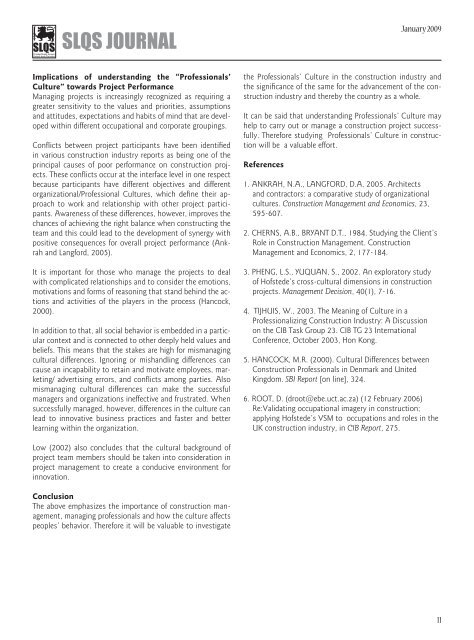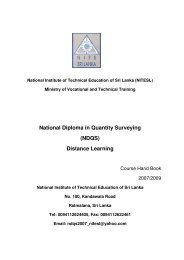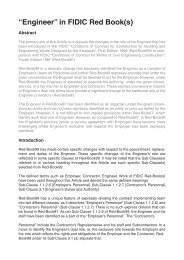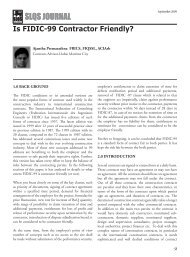SLQS-Journal Vol. 1 - Slqs-uae.org
SLQS-Journal Vol. 1 - Slqs-uae.org
SLQS-Journal Vol. 1 - Slqs-uae.org
You also want an ePaper? Increase the reach of your titles
YUMPU automatically turns print PDFs into web optimized ePapers that Google loves.
<strong>SLQS</strong> JOURNALJanuary 2009Implications of understanding the “Professionals’Culture” towards Project PerformanceManaging projects is increasingly recognized as requiring agreater sensitivity to the values and priorities, assumptionsand attitudes, expectations and habits of mind that are developedwithin different occupational and corporate groupings.Conflicts between project participants have been identifiedin various construction industry reports as being one of theprincipal causes of poor performance on construction projects.These conflicts occur at the interface level in one respectbecause participants have different objectives and different<strong>org</strong>anizational/Professional Cultures, which define their approachto work and relationship with other project participants.Awareness of these differences, however, improves thechances of achieving the right balance when constructing theteam and this could lead to the development of synergy withpositive consequences for overall project performance (Ankrahand Langford, 2005).It is important for those who manage the projects to dealwith complicated relationships and to consider the emotions,motivations and forms of reasoning that stand behind the actionsand activities of the players in the process (Hancock,2000).In addition to that, all social behavior is embedded in a particularcontext and is connected to other deeply held values andbeliefs. This means that the stakes are high for mismanagingcultural differences. Ignoring or mishandling differences cancause an incapability to retain and motivate employees, marketing/advertising errors, and conflicts among parties. Alsomismanaging cultural differences can make the successfulmanagers and <strong>org</strong>anizations ineffective and frustrated. Whensuccessfully managed, however, differences in the culture canlead to innovative business practices and faster and betterlearning within the <strong>org</strong>anization.the Professionals’ Culture in the construction industry andthe significance of the same for the advancement of the constructionindustry and thereby the country as a whole.It can be said that understanding Professionals’ Culture mayhelp to carry out or manage a construction project successfully.Therefore studying Professionals’ Culture in constructionwill be a valuable effort.References1. ANKRAH, N.A., LANGFORD, D.A, 2005. Architectsand contractors: a comparative study of <strong>org</strong>anizationalcultures. Construction Management and Economics, 23,595-607.2. CHERNS, A.B., BRYANT D.T., 1984. Studying the Client’sRole in Construction Management. ConstructionManagement and Economics, 2, 177-184.3. PHENG, L.S., YUQUAN, S., 2002. An exploratory studyof Hofstede’s cross-cultural dimensions in constructionprojects. Management Decision, 40(1), 7-16.4. TIJHUIS, W., 2003. The Meaning of Culture in aProfessionalizing Construction Industry: A Discussionon the CIB Task Group 23. CIB TG 23 InternationalConference, October 2003, Hon Kong.5. HANCOCK, M.R. (2000). Cultural Differences betweenConstruction Professionals in Denmark and UnitedKingdom. SBI Report [on line], 324.6. ROOT, D. (droot@ebe.uct.ac.za) (12 February 2006)Re:Validating occupational imagery in construction;applying Hofstede’s VSM to occupations and roles in theUK construction industry, in CIB Report, 275.Low (2002) also concludes that the cultural background ofproject team members should be taken into consideration inproject management to create a conducive environment forinnovation.ConclusionThe above emphasizes the importance of construction management,managing professionals and how the culture affectspeoples’ behavior. Therefore it will be valuable to investigate11





